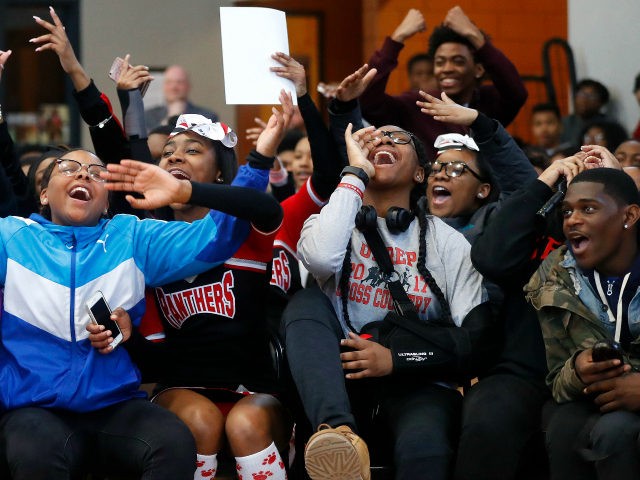California Gov. Gavin Newsom (D) is poised to sign a bill into law that would prohibit both traditional public and charter schools in the state from suspending students in grades K-8 for willfully defiant behavior.
Senate Bill 419 intends to address racial disparities in school discipline.
The Sacramento Bee reported:
Students of color are disproportionately suspended for unruly behavior in California schools. Black students made up just 5.6 percent of the total enrollment for academic year 2017-18, yet accounted for 15.6 percent of total suspensions for willful defiance, according to the education department.
By contrast, white students made up 23.2 percent of total enrollment and accounted for 20.2 percent of suspensions for willful defiance.
“These particular kinds of suspension are being used to harm young people and especially black people in particular,” said David Turner, with the Brothers, Sons, Selves Coalition, part of the Alliance for Boys and Men of Color, which cosponsored the bill.
“When we talk about racial equity, this bill is racial equity,” he said.
Turner said that when his group helped to implement Los Angeles Unified School District’s (LAUSD) ban on willful defiance suspensions for students in all grades, the number of suspensions fell, and the number of students who graduated rose.
The Bee reported the California Department of Education says school suspensions for disruptive behavior have decreased substantially since an initial ban was enacted in 2015.
“The number of suspensions for willful defiance declined by 30,000 just one year after the law took effect,” says the news report. “In the 2017-18 academic year, there were 363,406 total suspensions, of which fewer than 51,000 were for willful defiance.”
The report notes students in the state missed school more than 150,000 days due to disruptive behavior suspensions during the 2016-2017 academic year.
“Our goal needs to be to keep kids in school and to have them be successful,” said Sen. Nancy Skinner (D), the author of the legislation.
The legislation would expand the existing law that bans suspensions for willful defiance by students in grades K-3.
Instead of suspending students who are disruptive, the measure urges schools to use “restorative justice practices, trauma-informed practices, social and emotional learning, and schoolwide positive behavior interventions and support” to manage behaviors that are disturbing to classrooms and the school community.
However, a number of education policy analysts say the opposite is true: limiting suspensions for unruly behavior and enacting restorative justice programs are actually harming students.
Gail Heriot, a law professor at the University of San Diego and a member of the U.S. Commission on Civil Rights, wrote in April 2018 at the National Review that quoting racial disparities to support banning suspensions for disruptive conduct is “highly misleading.”
She explained:
The major reason for the disparity is clear, and it isn’t bias. As painful as it may be to admit, African-American students, on average, misbehave more than their white counterparts. Teachers (including African-American teachers) aren’t making this up, and it isn’t doing African-American students any favors to suggest otherwise.
Heriot observed that several studies, including a National Center for Education Statistics (NCES) report, show black students “self-report being in physical fights on school property at a rate more than twice that of white students.”
“Common sense,” Heriot suggested, as well as research, shows the likely reasons for the racial disparities in misbehavior. For example, children from fatherless households and those from impoverished backgrounds are more likely to be disruptive than other students, she said.
Similarly, Max Eden, a senior fellow with the Manhattan Institute, told the Las Vegas Review-Journal in March that the latest “restorative justice” practices are actually lowering test scores and increasing the number of students who feel unsafe at school.
Eden dismissed the claim that racism is the cause of more black students getting suspended or expelled than white students.
“Research since has shown that that’s not the case,” he said, asserting that teachers and administrators generally treat students fairly.
“Most of this disparity is being driven by the kind of inequalities and inequities in society that, unfortunately, disproportionately affect minority students,” he explained:
Students who come from a single-family household are twice as likely to get suspended. Black students are about three times as likely to come from a single-family household. They’re about three times as likely to get suspended.
So, the degree to which teacher bias, implicit bias, racism played a role was vastly overstated by these policy proposals. As a result, I think it’s really cut into a lot teacher discretion that was useful and cut into a lot of judgments that were being made justly.
Eden said the decision to end clear disciplinary practices, such as consequences for misbehavior, leads not only to a climate of unsafety in schools, but also a negative impact on school achievement.
“In California, when they banned suspensions and tried to introduce restorative justice, the academic effects in math were so bad that it would drag a student down from the 50th percentile to the 32nd percentile,” he said.
The California State Parent-Teacher Association, the Association of California School Administrators, and the LAUSD endorse the legislation.
However, Eric Premack, executive director of the Charter School Development Center, said such legislative mandates undermine the purpose of charter schools.
“Charter schools, the whole concept, is to allow these decisions to be made at the school level, rather than a one size fits all legislative version,” he said, according to the Bee.
Premack added his organization is concerned about the prohibition on expulsion for unruly behavior. He explained that since charter school programs often have students who use power tools and similar equipment, they are “concerned with how this could affect (the program’s) ability to function.”

COMMENTS
Please let us know if you're having issues with commenting.